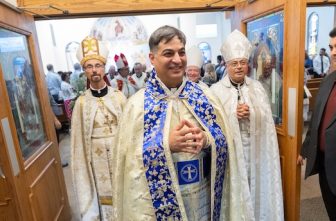 The Doctor from Heaven. In addition to being known as Son of God, Messiah, Lord, Teacher, Lamb of God, Good Shepherd, Savior and Redeemer, Jesus is also known at the Divine Physician. This title comes from Jesus’ statement: “Those who are well do not need a physician, but the sick do” (Mt 9:12 and Mk 2:17; see also Lk 5:31).
The Doctor from Heaven. In addition to being known as Son of God, Messiah, Lord, Teacher, Lamb of God, Good Shepherd, Savior and Redeemer, Jesus is also known at the Divine Physician. This title comes from Jesus’ statement: “Those who are well do not need a physician, but the sick do” (Mt 9:12 and Mk 2:17; see also Lk 5:31).
Not Your Average Physician. While many doctors specialize in a certain aspect of medicine, Jesus is a generalist. Jesus is a primary care physician and a family doctor, the one who attends to us first with our ordinary ailments, but he is also on call at all times, the doctor at urgent care or the emergency room, the one who is there for us in times of crisis when the situation is serious. Jesus is also the neurologist who attends to our feelings, the pulmonologist who is the breath of life, and the cardiologist with a Sacred Heart who heals those with wounded or broken hearts. He is a holistic doctor that attends to a person’s total well-being, body and soul.
Triage: Address the Most Life Threatening Illness First. When it comes to healing, Jesus, the Divine Physician, is more concerned about a person’s spiritual well-being than physical well-being. Jesus came first and foremost for salus, the Latin word for health, and his top priority is a person’s eternal health, salvation. The most urgent cure, then, is the forgiveness of sins so the person can be recreated, born anew, and enjoy perpetual perfect health in the heavenly mansion in the new and eternal Jerusalem.
The Sin-Sick Soul. Jesus demonstrated the priority that he places on the wellness of the soul when a paralyzed man was lowered in front of him. The first thing that Jesus told the paralytic was, “Child, your sins are forgiven” (Mk 2:5). Jesus knew the man would like to be able to walk from place to place, and Jesus was very concerned about his long term physical disability, but Jesus was far more concerned about his ability to walk into heaven. Jesus cured the paralytic’s spiritual infirmities with his healing words, and he extends his spiritual cure to each and every person with the blood that he shed on the Cross for the forgiveness of sins (Mt 26:28).
The Sick Body. Jesus also cured the paralytic’s paralysis which shows that Jesus has great compassion for the sick in their suffering. He focused a great deal of his time and energy on the sick from his first days in Capernaum (Mk 1:21-28,31,34) to his last day at his arrest in Gethsemane when he healed the severed ear of the high priest’s slave (Lk 22:51). Jesus healed Peter’s mother-in-law’s fever (Mk 30-31), many who were sick with various diseases (Mk 1:34; 6:56), a leper (Mk 1:42), a man with a withered hand (Mk 3:5), a woman with a hemorrhage (Mk 5:29), a deaf man (Mk 7:35), a blind man (Mk 8:25), and blind Bartimaeus (Mk 10:52).
Sacramental Grace. The Sacrament of the Anointing of the Sick is an encounter with Jesus, the Divine Physician. Jesus’ first concern is spiritual well-being, and the sacrament imparts the forgiveness of sins and the special grace restores spiritual health. It is important to note that when Jesus performed his miraculous healings, “He cured many who were sick” (Mk 1:34a) – not all. A physical healing does not occur every time because suffering is redemptive and each person will die eventually, but the sacrament often confers a marvelous miraculous grace, either physical improvement or a total cure.




